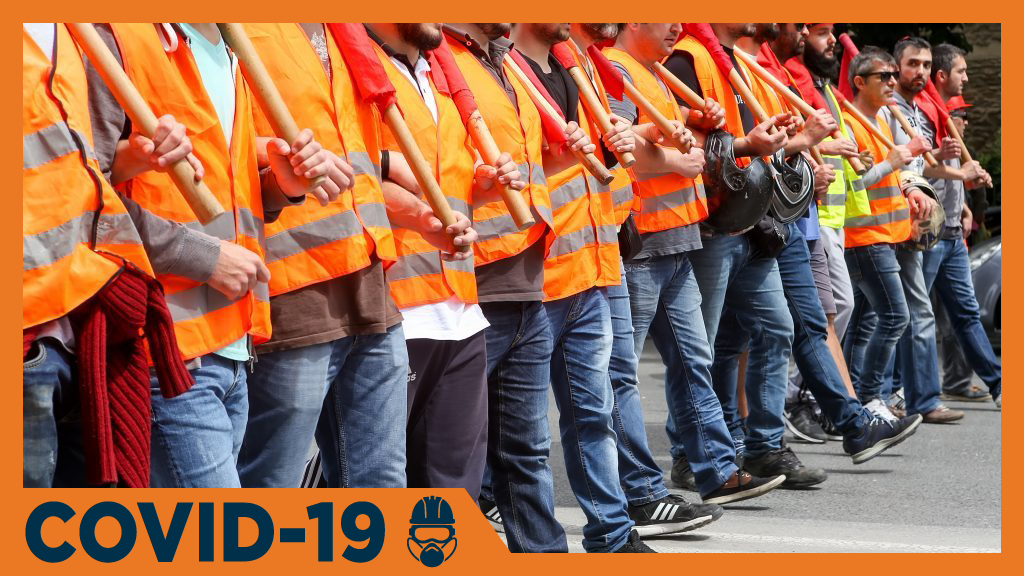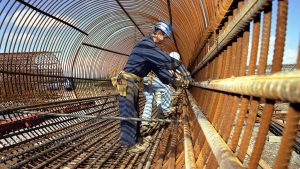Ontario construction employers and workers are reacquainting themselves with workplace legislation to understand the boundaries of an employee’s right to refuse work during the COVID-19 pandemic.
The 100,000 members of the Labourers International Union of North America (LIUNA) in Ontario have maintained a steady flow of questions into their locals as the pandemic has spread across the province, reports LIUNA Ontario Provincial District Council general counsel Sean McFarling. The Labourers have 13 lawyers employed on union business, McFarling said, and workers’ rights during the virus upheaval have been at the top of their agenda lately.
“There have been a lot of questions,” said McFarling in a recent interview. “It’s fair to say that business reps have been receiving more calls than normal.”
LIUNA has prepared a question-and-answer fact sheet based mainly on members’ questions.
First off, the union explained that the provincial state of emergency declared by Premier Doug Ford does not close construction sites.
“If your workplace is open, subject to any specific health and safety concerns, you are expected to go to work. Employees who are required to attend work and are not covered by the state of emergency, including construction workers, always have a choice to make about withdrawing your services and quitting,” the fact sheet, prepared by LIUNA’s legal team, stated.
Under Ontario’s Occupational Health and Safety Act, it was explained, employers owe a duty under section 25(2)(h) to take every reasonable precaution for the safety of the worker.
Section 43(3) gives workers the right to refuse unsafe work if, among other reasons, the physical condition of the workplace is likely to endanger them.
The statutory threshold required to justify a work refusal is quite low, suggests Ontario construction lawyer Norm Keith of Fasken Martineau DuMoulin. He wrote in a recent article that a worker need only have a subjective belief that they may be unsafe at work, which covers many circumstances related to COVID-19, he said.
“The question becomes, if someone personally, emotionally feels unsafe, they have to give a reason, it has to be specific about the workplace,” he explained in a March 19 interview. “The employer has to investigate and engage the safety rep and the safety committee.”
If the work refusal is not resolved internally, then the employer must notify the regulator, the Ministry of Labour, Training and Skills Development.
I think what an inspector could say, my speculation is, you’ve got to limit the size of the crew,
— Norm Keith
Fasken Martineau DuMoulin
Two major incidents of work refusals related to COVID-19 have involved TTC employees who refused to work due to concerns over the deep cleaning of streetcars and 166 workers at an auto plant in Windsor, Keith noted.
In both cases, a ministry inspector visited the workplace, determined that the work refusal did not meet the required criteria, and ordered the refusing workers to return to work.
Keith, who generally represents construction employers, said he doesn’t think the implications of the virus on workplace rights has fully sunk in with employers. He is sending out information to his clients but there has not been a major increase in queries yet.
“I think that’s coming,” he said.
The Ontario government’s Emergency Management and Civil Protection Act will prohibit gatherings of 50 or more people. Keith said he does not think that will automatically become a threshold above which a workplace might be declared unsafe.
“I think there is very little there to suggest that just the number 50 on a construction site would result in a work refusal,” he said.
McFarling said LIUNA Local 183 has received questions from workers engaged in sewer and watermain work, working in confined spaces on high-rise jobs and having to enter occupied low-rise homes about special dangers in those circumstances.
An inspector would look at the specific circumstances of a jobsite to determine if an order is justified, Keith suggested.
“I think what an inspector could say, my speculation is, you’ve got to limit the size of the crew, or the numbers of people in a particular area if it’s a large project, or if it involves finishing indoors, you limit the number of people in a closed space,” he remarked.
LIUNA addressed the provincial maximum of 50 people at a gathering on its website in response to a member inquiry.
“The union expects employers to be aware of this requirement and to ensure that they comply,” the fact sheet stated. “If you believe that the job site is not safe (due to the number of people or for other reasons) you have the right to refuse work.”
Another question asked whether the union is planning to shut down job sites. The response stated, “Each employer determines whether or not to continue operating. So long as they are operating, the union will continue to represent you in your employment and to enforce the applicable collective agreement and work-related laws and statutes. If the employer temporarily shuts down, the union will try to assist you in finding other work.
“The practical reality is that many of our members wish to continue to work while it is safe for them to do so. The union will assist its members by ensuring that all reasonable precautions have been put in place for their safety.”
Follow the author on Twitter @DonWall_DCN.











Recent Comments
comments for this post are closed